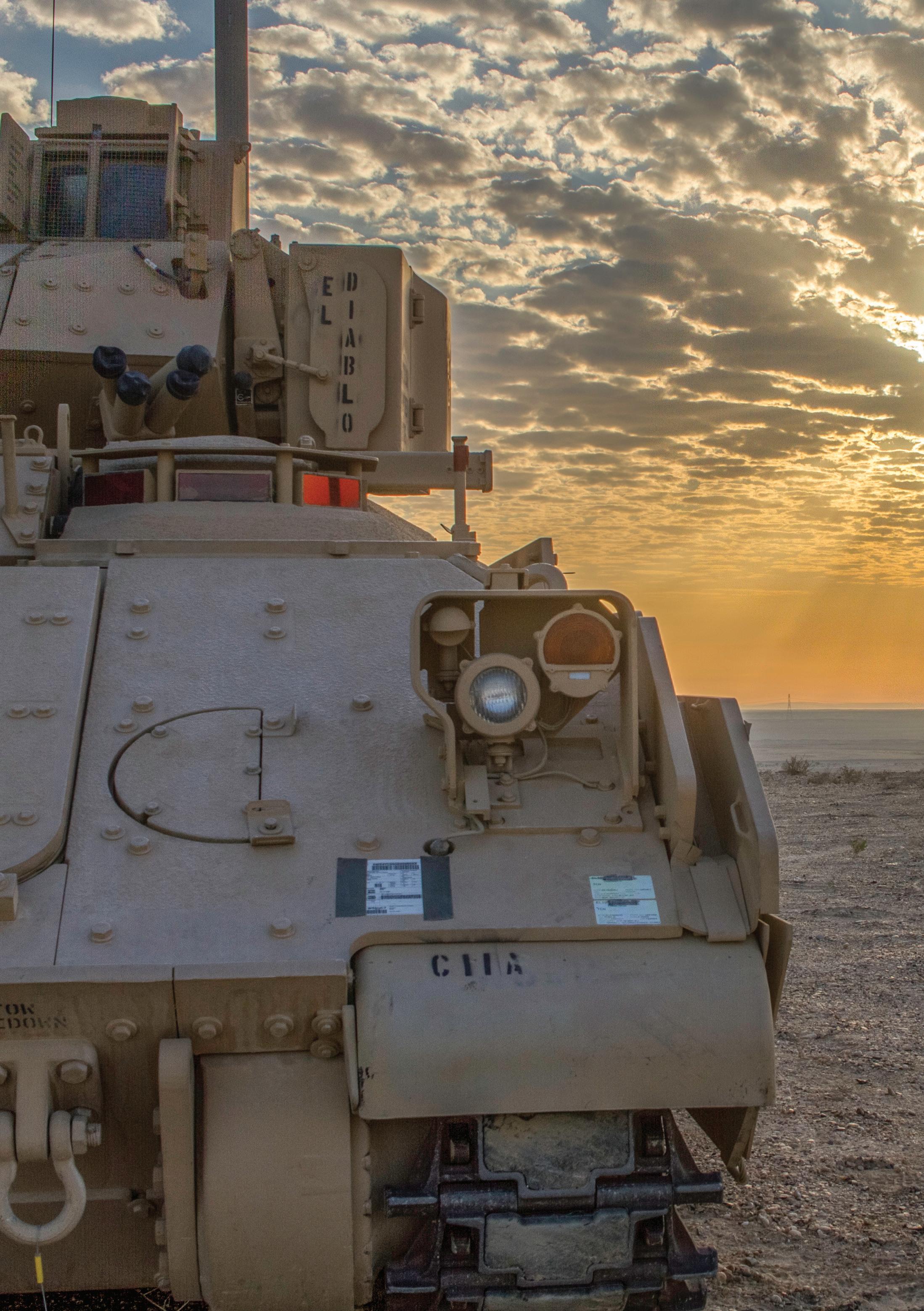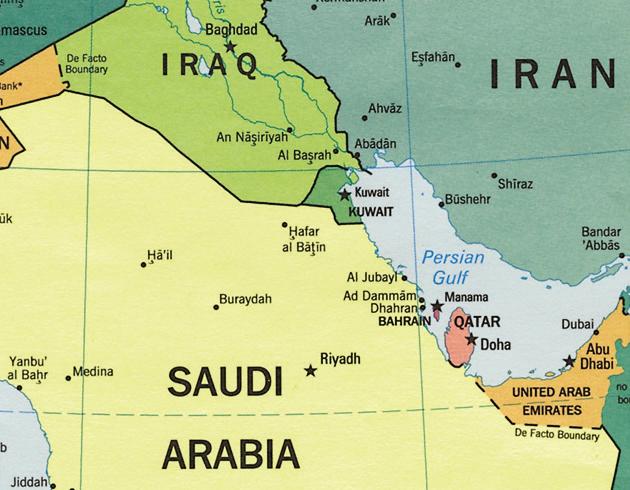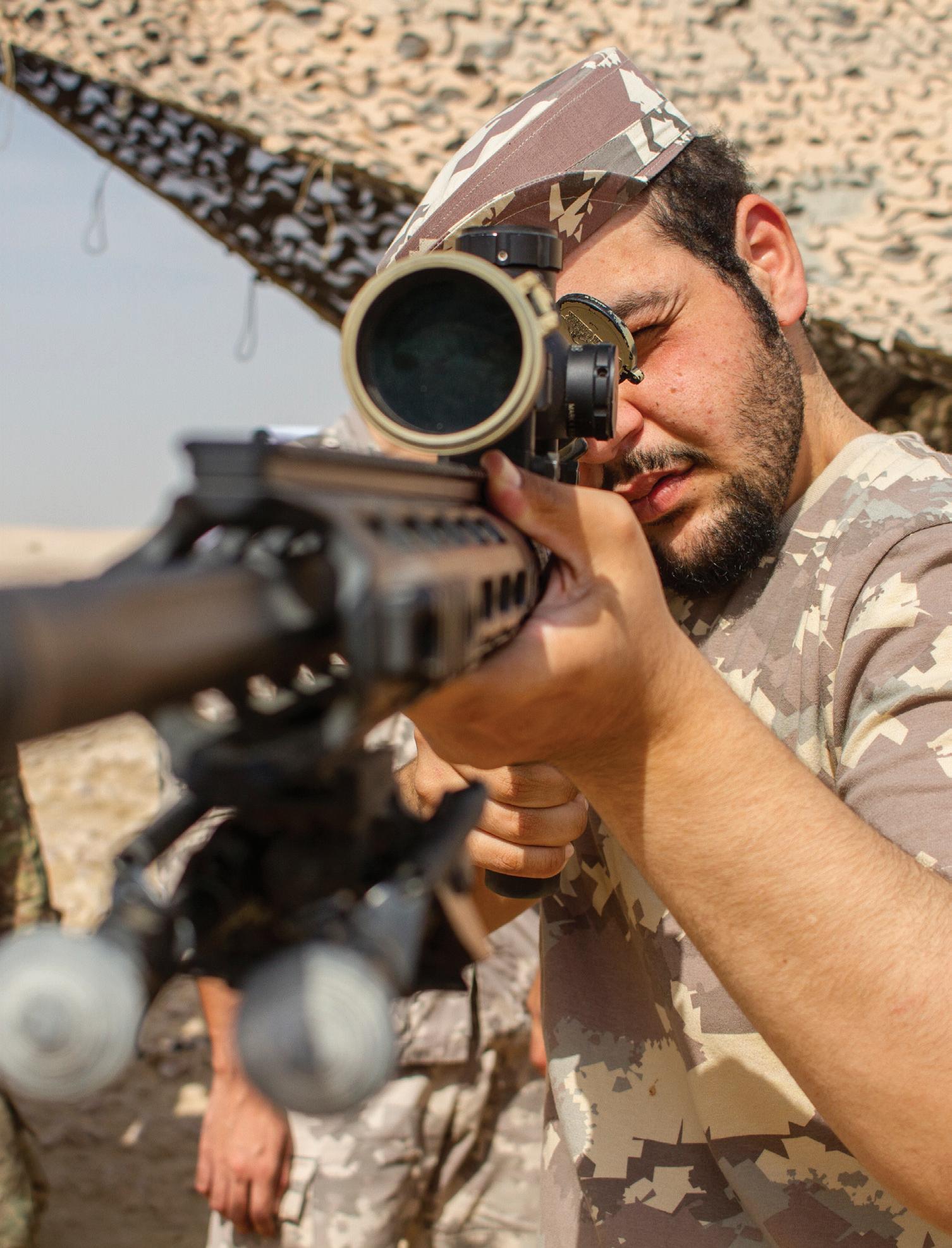
7 minute read
Managing Crisis
4 Strategic Vision The Middle East
Comprehensive measures are needed to solve Gulf crisis
Advertisement
by J. Richard Hu

The sun rises above an M2A3 Bradley Infantry Fighting Vehicle during Exercise Eastern Action 2019 at Al-Ghalail Range in Qatar, Nov. 11, 2018.
photo: Jovi Prevot
Since 5 June, 2017, Saudi Arabia, Bahrain, the UAE, and Egypt have severed diplomatic ties with Qatar. Then, on 22 June, 2017, these four countries presented 13 specific demands to Qatar and took hostile measures such as closing their airspace to Qatari aircraft, despite Qatar being a fellow member of the Gulf Cooperation Council (GCC). Qatar has encountered a variety of hard hits from immediate food supply shortage, to diplomatic isolation, and even a potential foreign military invasion.
Qatar has been told by those boycotting countries that it needs to accept six broad principles as a precondition to restart the negotiation process. Although this major crisis in Qatar’s history has no end in sight, and an immediate diplomatic and economic blockade and military coercion are highly provocative, a willingness for discussion and compromise, at least rhetorically, has been uttered by boycotters from the very beginning.
Leaders in Qatar have criticized and refused to comply with the sweeping 13-point list and six principles given by those four countries because of their ruthless disregard for Qatar’s sovereignty and feelings. Some of those asserted demands and principles are enumerated below.
Qatar must reduce diplomatic ties with Iran, close Iranian diplomatic missions in Qatar, expel members of Iran’s Islamic Revolutionary Guard Corps, and disrupt military and intelligence cooperation with Iran. Trade with Iran must respect US and international sanctions in a way that does not jeopardize the security of the Gulf Cooperation Council, they demand. Moreover, they call for the immediate closure of the Turkish military base which is currently under construction, and the cessation of military cooperation with Turkey inside Qatar.

image: CIA.gov
Disavow terrorists
Another issue is the demand that Qatar weaken ties with all terrorist, sectarian and ideological organizations, in particular the Muslim Brotherhood, Daesh, al-Qaeda, Fateh al-Sham and Lebanon’s Hezbollah, and formally declare these entities to be terrorist organizations. Moreover, Qatar must close Al Jazeera television and its affiliated posts.
Qatar must stop all funding for people, groups, or organizations that have been designated as terrorist groups by Saudi Arabia, the United Arab Emirates, Egypt, Bahrain, the United States, and other countries.
Qatar must establish compensation payments for loss of life and other financial losses caused by Qatar’s policies in recent years, and Qatar’s military, social, and economic policies must be aligned with those of the other Gulf and Arab states.
Qatar must accept all requests within 10 days of sending the list to Qatar or the list will become invalid. Moreover, approval of monthly compliance audits must be made in the first year after they have agreed upon the requirements, followed by quarterly audits in the second year and annual audits over the next 10 years.
It has been more than one year since the beginning of the GCC-Qatar issue. Apparently, as there is no sign of easing and lifting the current embargo, the situation is expected to continue to evolve for an extended period of time. This will proportionately inflict a new stage of potentially more severe business losses, economic setbacks, and social and political ramifications domestically on Qatar. As reconciliation endeavors have mainly been thwarted by reciprocal antagonisms, Qatar will still need to boost consensus and unity among its 2.7 million people. Essentially, Qatar, with its still rich resources, could put a more proactive effort into winning positive support both domestically and internationally. Four of those measures are discussed below.
As recommended and illuminated by Sun Tzu in his masterpiece “The Art of War,” “if you know your enemies and know yourself, ” you will not be imperiled in a hundred battles. Therefore, comprehensive and effective intelligence is one of the most fundamental elements to guaranteeing foreign-policy decision making and implementation that is pragmatic and successful. Given all the security threats and challenges, including the worst-case scenario of a potential military invasion, from its powerful neighbors, Qatar needs to pragmatically assess past performance and deftly adapt to situations and contexts to obtain advantages in managing interplays with its rivals and in preparing useful countermeasures. Since Saudi Arabia is the initiator and takes the lead in diplomatic spats with Qatar, Riyadh’s moves and sophisticated nuances are the central focus in terms of intelligence operations. Still, effective national security reactions will essentially be based on sound intelligence.
Secondly, Doha must ensure the presence of foreign troops in Qatar, as they are essential to fending off internal coups and foreign invasions. Qatar currently hosts around 11,000 US troops, yet still enjoys a military cooperation pact with Iran. This has spurred hostilities between Qatar and the boycotters. The presence of the Qatari military and foreign troops operating together could aid in the formation of steadfast alliances to deter a potential foreign assault or a domestic revolt. Military and security strength are critical in boosting Qatar’s international negotiation clout and internal political stability. Moreover, through the current construction of a Turkish military base, Qatar could also bring in foreign troops to safeguard Qatari defense.

A Qatari soldier during sniper training as part of Exercise Eastern Action 19 on Nov. 6, 2018
photo: Jovi Prevot
Third, Doha must promote strategic communication and reinforce the power of narrative. As Harvard Professor Joseph Nye has well remarked, “success depends not only on whose army wins, but also on whose story wins.” The importance of strategic communication and political warfare both internally and externally has increased in dealing with interstate and intrastate conflicts. To a certain extent, strategic communication, political warfare, and Beijing’s concept of Three Warfares have been employed in dealing with international affairs in a variety of confrontations such as the South China Sea disputes by countries
like Vietnam, the Philippines, the United States, and China. Concerning the Gulf diplomatic rift, winning support domestically and internationally will have a tremendous impact on whether Qatar can sustain accusations, challenges, threats of most kinds, and eventually alleviate and solve the dispute.

The Combined Air Operations Center (CAOC) at Al Udeid Air Base, Qatar, provides command and control of air power in 17 nations in the region.
photo: Joshua Strang
Effective strategic communication and political warfare also aim at winning the hearts and minds of key decision makers and the majority of people in boycotting countries. In so doing, these forms of warfare, empowered by new tools and techniques of this information age, could be conducted through traditional and non-traditional ways. Traditional ways include passing messages on to targeted audiences via media reports, official news releases, academic conferences, and diplomatic talks.

A Qatar Emiri Air Force Dassault Mirage 2000-5 fighter jet takes off as part of a Joint Task Force Odyssey Dawn mission 2011.
photo: Paul Farley
Non-traditional paths encompass sending messages to selected receivers through social media, websites, and other means of communication, especially those in the cyber domain. In the new era of competition and conflict, strategic communication should first avoid information fratricide: In other words, if you can’t walk the walk, don’t talk the talk. In most cases, the best communication channel usually goes through an indirect approach. Moreover, both theoretically and experimentally, preferred channels for conveying those messages often are third parties such as perhaps Kuwaiti ministers, Jordanian scholars, German journalists, or American businessmen.
Finally, Qatar must transform its image. The crisis shows that Qatar has been asked by its neighbors to soothe the spat, and that Qatar is being pressured into accepting the six broad principles on combating extremism and terrorism. There are actually two key problems at issue which have exacerbated them greatly in recent years. One key issue is Qatar’s support for Islamic extremist groups. The other is Qatar’s relations with Iran, and this Shia powerhouse is Sunni-ruled Saudi Arabia’s primary regional rival. Qatar has refused to accept the two demands mentioned above largely because those measures threaten its independent sovereignty. However, while Qatar is unlikely to retreat from its ambitious foreign policy, it still needs to further clarify Doha’s intentions and hopefully transform its national image. From an international and conflict-resolution perspective, Qatar could bridge the gap and act as an important mediator in regional conflicts. It could clearly show that aiding extremist groups linked to al-Qaeda or the Islamic State was, and will continue to be, excluded from Doha’s policies, and simultaneously stress that hosting Islamist delegations such as al-Qaeda is based on good will, to avoid the escalation of regional conflict.
In a similar vein, moderate engagements with Teheran might be critical in cooling down the heat of confrontation between Sunni and Shia Muslims. With no usable communication and conciliation channel between rivals, there is the danger that disputes will become worse, which could spell disaster.
About the author
J. Richard Hu is a retired ROC Army major general and a professor of strategy at the ROC National Defense University.


